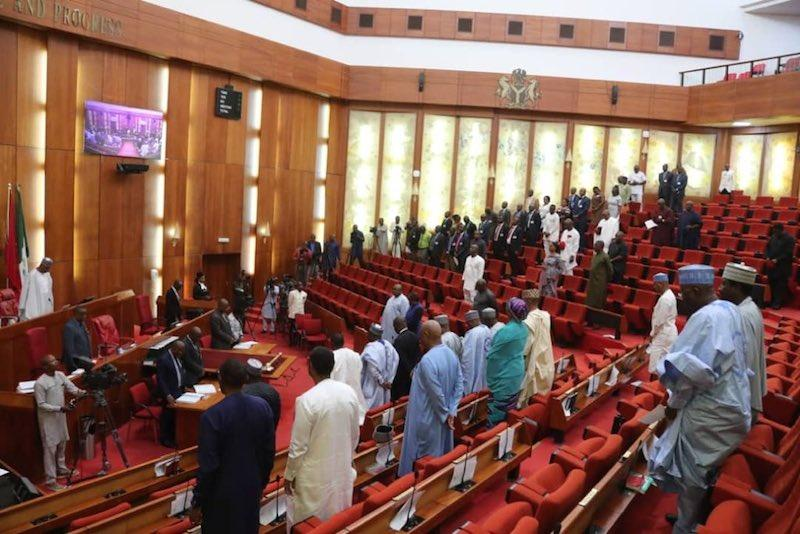In a significant legal development, a Nigerian court has detained Bodejo for 60 days amid ongoing investigations into serious allegations of banditry in Nigeria. The Federal High Court, led by Justice Emeka Nwite, granted this request from the Defence Intelligence Agency (DIA) after an ex-parte motion was filed by counsel I.O. Odom. Bodejo, the leader of the Miyetti Allah herders’ union, along with six others, is under scrutiny for their involvement in illegal arms possession and coordinated attacks on military formations. This detention order is a crucial step in the Nigerian courts updates, reflecting the government’s commitment to combating rising insecurity. As the nation grapples with increasing instances of violence, the Bodejo arrest news has sparked widespread attention and concern regarding the implications for national security and public safety.
In a recent ruling, a Nigerian court has imposed a 60-day detention on Bodejo, the head of the Miyetti Allah Kautal Hore, as part of a broader investigation into criminal activities linked to banditry. This decision comes amid heightened scrutiny of the actions of various groups within Nigeria, particularly concerning their alleged involvement in illegal arms trade and violence against civilians. The Defence Intelligence Agency (DIA) has been actively pursuing cases related to these issues, seeking to ensure public safety and bolster national security. The unfolding situation highlights the urgent need for effective legal measures in addressing the escalating threats posed by armed groups in the region. As the investigation continues, stakeholders are keenly watching for further developments in this case and its potential repercussions on broader efforts to restore order.
Nigerian Court Grants 60-Day Detention for Bodejo and Associates
In a significant ruling, the Federal High Court in Nigeria has granted a request to detain Alhaji Bello Bodejo, the President of the Miyetti Allah Kautal Hore, alongside six others for a period of 60 days. This decision was made by Justice Emeka Nwite after an ex-parte motion brought by the Defence Intelligence Agency (DIA). The motion, filed under case number FHC/ABJ/CS/1875/V/2024, aims to facilitate a thorough investigation into serious allegations of banditry and illegal firearm possession against the detained individuals. The court’s ruling underscores the gravity of the situation surrounding banditry in Nigeria, which has become a pressing national security concern.
The DIA’s request highlighted the necessity of this detention to allow for comprehensive investigations into the alleged crimes of the respondents, who were apprehended by the Nigerian Armed Forces in Nasarawa State. The arrest was linked to an attack on a military formation that resulted in severe injuries to personnel and civilians. This ruling is part of broader efforts by Nigerian courts to address issues of insecurity and uphold the rule of law in tackling banditry and related crimes.
Overview of Miyetti Allah’s Role in Banditry Allegations
Miyetti Allah, a prominent herders’ union in Nigeria, has been frequently associated with rising tensions and violence in various regions of the country, particularly in the Middle Belt. The allegations against Bodejo and his associates have raised significant concerns about the group’s involvement in banditry. Reports indicate that members of the Miyetti Allah Kautal Hore have been linked to attacks on local farmers and violent confrontations with the Nigerian Armed Forces, leading to an escalation of insecurity in the region. The current detention of Bodejo is seen by many as a crucial step in addressing these allegations and restoring order.
The Defence Intelligence Agency’s investigations into the activities of Miyetti Allah highlight the need for accountability and transparency in addressing the complexities of banditry in Nigeria. As the court proceedings unfold, it is essential to closely monitor how these developments will impact public perception of herders’ unions and their role in the ongoing security challenges facing the nation. The situation remains fluid, and the upcoming court dates are likely to shed further light on the implications of these allegations.
Implications of Bodejo’s Arrest on National Security
The detention of Bodejo and his associates by the Nigerian court raises critical questions regarding national security and the ongoing battle against banditry in the country. The DIA’s assertion that releasing the suspects could jeopardize investigations reflects the seriousness of the situation. With banditry posing a significant threat to public safety, the government is under increasing pressure to take decisive action against individuals and groups implicated in such activities. The legal proceedings against Bodejo will be closely watched as they may set a precedent for how the Nigerian judiciary handles cases involving notable figures linked to insecurity.
Moreover, the allegations against Bodejo emphasize the broader implications of herders’ activities in Nigeria, particularly as they relate to communal conflicts and agricultural disputes. As the court examines the evidence and the DIA continues its investigations, there is a collective hope that justice will be served, ultimately contributing to the stabilization of affected regions. The outcome of this case could significantly influence future policies regarding security and the management of conflicts between herders and farming communities.
Legal Proceedings and the Role of the Defence Intelligence Agency
The recent developments in the detention of Bodejo and six others underscore the crucial role of the Defence Intelligence Agency (DIA) in handling security-related cases in Nigeria. The DIA’s involvement signifies the government’s commitment to thoroughly investigate allegations of banditry and illegal arms possession. As the court has granted a 60-day detention period, the agency will have the necessary time to gather evidence and assess the full scope of the alleged crimes. This legal framework is designed to ensure that investigations are conducted transparently while upholding the rights of the individuals involved.
Furthermore, the legal proceedings against Bodejo are significant in the context of Nigeria’s judicial system. The court’s decision to detain the suspects reflects a growing recognition of the need for robust legal mechanisms to combat insecurity. As the case unfolds, it will be essential for all parties involved, including the DIA, prosecution, and defense, to adhere to the principles of justice and due process. The outcome of these proceedings could have lasting implications for how similar cases are approached in the future, particularly in relation to banditry and the activities of groups like Miyetti Allah.
Public Reactions to Bodejo’s Detention and Its Aftermath
The public response to the detention of Bodejo has been mixed, reflecting the complexities surrounding the issue of banditry in Nigeria. Many citizens express relief, viewing the court’s decision as a necessary step towards accountability and justice. On the other hand, there are concerns regarding the potential impact of this case on the broader herding communities, with fears that it may exacerbate existing tensions between farmers and herders. The narrative surrounding Miyetti Allah and its leadership continues to evolve as new information emerges from ongoing investigations.
Social media platforms and news outlets are abuzz with discussions about the implications of Bodejo’s detention for the herders’ union and the fight against insecurity in Nigeria. As the case gains prominence, it is crucial for stakeholders to engage in constructive dialogue to address the root causes of banditry and promote peaceful coexistence among communities. The next hearing scheduled for March 3, 2025, will be pivotal in shaping public opinion and determining the future of Bodejo and his associates in light of the serious allegations against them.
The Role of Nigerian Courts in Addressing Banditry
The Nigerian judiciary has increasingly found itself at the forefront of addressing pressing security issues, including banditry and related violence. The decision to grant a 60-day detention for Bodejo and others reflects the courts’ understanding of the gravity of the allegations and the necessity for thorough investigations. As the judiciary navigates complex cases involving high-profile individuals, such rulings are critical in reinforcing the rule of law and ensuring that justice is served in the face of rising insecurity.
Moreover, the involvement of the courts in such matters signals to the public that the legal system is responsive to the challenges posed by banditry in Nigeria. By upholding the rights of the accused while allowing for necessary investigative processes, the courts are playing a vital role in balancing justice and national security. The ongoing attention to cases like Bodejo’s highlights the judiciary’s commitment to addressing the multifaceted nature of insecurity in Nigeria, with the potential to influence future legal and policy frameworks.
Future of Banditry Legislation in Nigeria
As the legal proceedings surrounding Bodejo and his associates unfold, there is an urgent call for a reassessment of existing laws and policies related to banditry and insecurity in Nigeria. The current legal framework must evolve to effectively address the sophisticated tactics employed by armed groups, and the government’s response must be proactive rather than reactive. The outcomes of high-profile cases such as this one could serve as a catalyst for legislative reforms aimed at enhancing the country’s ability to combat banditry and protect vulnerable communities.
Legislators and policymakers are urged to consider comprehensive strategies that address the underlying causes of banditry, including the socioeconomic factors that drive individuals to engage in criminal activities. Public discourse surrounding Bodejo’s detention could pave the way for more robust legislation and collaborative efforts between government agencies, security forces, and local communities. As the nation grapples with issues of security and justice, the need for effective and equitable solutions has never been more pressing.
Impacts of Detention on Community Relations
The detention of Bodejo and his associates may have far-reaching effects on community relations, particularly between herders and farming communities. As tensions rise and public sentiment shifts, there is potential for increased polarization, which could hinder efforts toward reconciliation and conflict resolution. It is crucial for community leaders and stakeholders to engage in open dialogue to mitigate misunderstandings and foster cooperation in the face of these challenging circumstances.
Additionally, the implications of this case extend beyond the immediate parties involved, as broader societal dynamics are at play. The narrative surrounding Miyetti Allah and its members may influence public perceptions and attitudes, which could further complicate relations in regions affected by banditry. It is essential to promote peacebuilding initiatives that encourage collaboration among all community members, regardless of their backgrounds, to address the root causes of conflict and work towards sustainable solutions.
Conclusion: The Path Forward for Nigerian Security
As the legal proceedings against Bodejo and his associates continue, it is imperative for all stakeholders to remain focused on the broader goal of national security. The court’s decision to detain these individuals for 60 days underscores the seriousness of the allegations and the need for a comprehensive approach to addressing banditry in Nigeria. The collaboration between the judiciary, the DIA, and other security agencies is crucial in ensuring that justice is not only served but that it also contributes to the long-term stability of the nation.
Moving forward, it is essential to foster a proactive and inclusive dialogue among all communities affected by banditry. Addressing the underlying issues that contribute to insecurity will require a concerted effort from government officials, local leaders, and citizens alike. The implications of Bodejo’s case extend beyond the courtroom, emphasizing the necessity for a holistic approach to security that prioritizes collaboration, understanding, and justice for all Nigerians.
Frequently Asked Questions
What are the details of the Nigerian Court detaining Bodejo for 60 days?
On December 31, 2024, a Nigerian Court granted the Defence Intelligence Agency (DIA) permission to detain Alhaji Bello Bodejo, the President of Miyetti Allah Kautal Hore, along with six others for 60 days. This decision was made to facilitate ongoing investigations into serious allegations including banditry and illegal arms possession.
Why was Bodejo arrested and detained by the Nigerian Court?
Bodejo was arrested on December 11, 2024, by the Nigerian Armed Forces and subsequently transferred to the DIA. The detention for 60 days was approved by Justice Emeka Nwite to allow thorough investigations into allegations of his involvement in banditry and orchestrating attacks on military formations.
What implications does the detention of Bodejo have on banditry in Nigeria?
The detention of Bodejo for 60 days may have significant implications on banditry in Nigeria as it aims to uncover the networks behind these criminal activities. The investigations could lead to further arrests and a stronger legal framework to combat banditry and enhance national security.
How does the Nigerian court system handle cases involving banditry and illegal arms possession?
The Nigerian court system, as demonstrated in the Bodejo case, allows for detentions under ex-parte motions when the Defence Intelligence Agency presents compelling evidence that further investigation is necessary. This reflects a legal approach to addressing serious crimes such as banditry and illegal arms possession.
What was the outcome of Bodejo’s previous detention by the Department of State Services?
In a separate ruling, Justice Mohammed Zubairu ordered Bodejo’s release from the Department of State Services (DSS) detention on December 9, 2024, deeming it unlawful as he had been held without charges. This highlights the complexity of legal proceedings involving figures like Bodejo amid allegations of banditry.
What role does the Defence Intelligence Agency play in the detention of Bodejo?
The Defence Intelligence Agency (DIA) plays a crucial role in the detention of Bodejo by conducting investigations into allegations of banditry and illegal arms possession. Their work is supported by the Nigerian Court’s granting of a 60-day detention period to gather evidence and assess the suspects’ involvement in these crimes.
What are the next steps after the Nigerian Court’s ruling on Bodejo’s detention?
Following the Nigerian Court’s ruling to detain Bodejo for 60 days, the next steps involve ongoing investigations by the DIA into the allegations of banditry. The case is scheduled for mention on March 3, 2025, when further legal proceedings and potential charges may be discussed.
How does the public perceive the detention of Bodejo and its relation to Miyetti Allah?
The public perception of Bodejo’s detention is mixed, as some see it as a necessary step towards addressing banditry in Nigeria, while others may view it through the lens of ethnic and political implications related to Miyetti Allah’s activities. The case has sparked discussions on security and governance in Nigeria.
| Key Points |
|---|
| The Nigerian Court has granted a request to detain Bodejo and six others for 60 days, allowing investigations into serious allegations. |
| The detention was approved by Justice Emeka Nwite after an ex-parte motion by the Defence Intelligence Agency (DIA). |
| The respondents were arrested on December 11 for banditry and illegal possession of firearms in Nasarawa State during an attack on local farmers. |
| The investigations revealed that military arms were stolen during the attack, and several weapons were recovered from the suspects. |
| The judge acknowledged the necessity of detention to prevent jeopardizing the ongoing investigations and maintain public safety. |
| A separate ruling previously ordered Bodejo’s release from DSS detention due to unlawful detention without charges since December 9. |
Summary
Nigerian Court detains Bodejo for 60 days as the investigation into allegations of banditry and illegal arms possession unfolds. The decision by Justice Emeka Nwite highlights the seriousness of the charges against Bodejo, the leader of the Miyetti Allah Kautal Hore, and emphasizes the need for thorough investigations to ensure justice is served. The court’s order reflects a commitment to maintaining national security amidst growing concerns over armed violence in the region.



